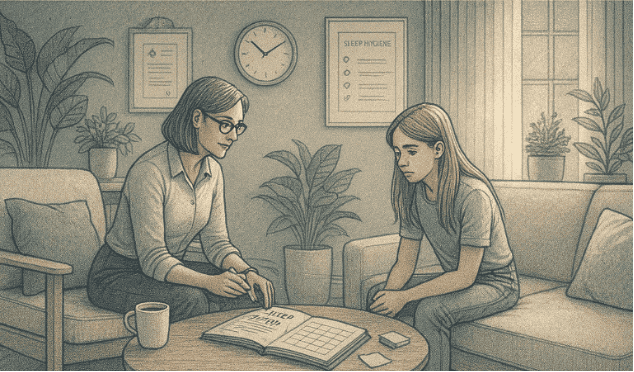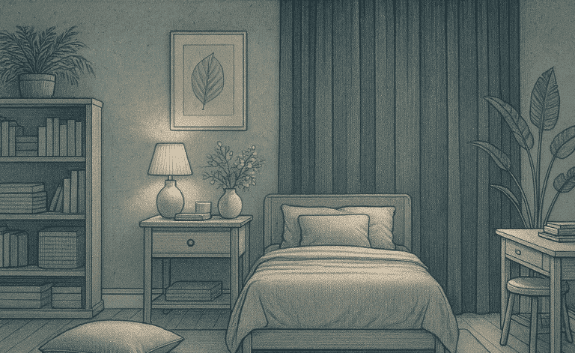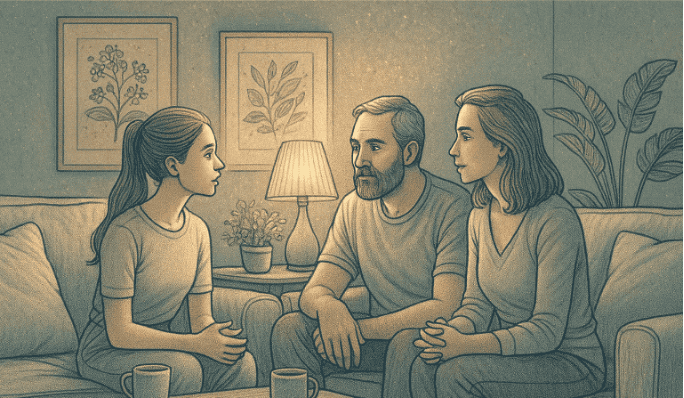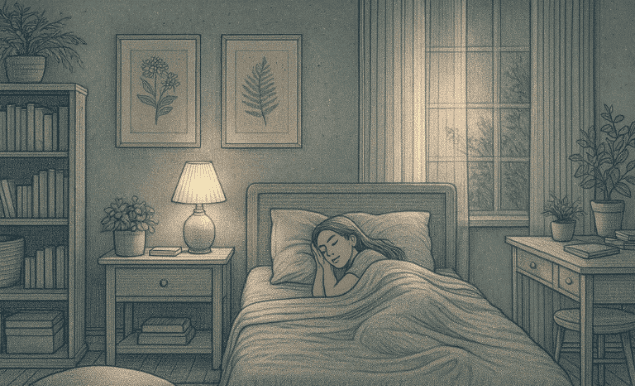Key Takeaways
- Cognitive-Behavioral Therapy for Insomnia (CBT-I) is the most effective treatment for teens, helping them reshape both their thoughts and habits around sleep while building long-term coping tools.
- Natural sleep aids and environmental changes can support recovery, with calming teas, magnesium, lavender aromatherapy, and optimized bedroom conditions working best alongside therapy.
- Strong sleep hygiene practices and behavioral routines are essential, including consistent bedtimes, limiting screens at night, creating relaxing pre-sleep rituals, and managing diet and exercise.
- Family support and addressing underlying mental health conditions make treatment more successful, since anxiety, depression, and household stress often fuel insomnia and need to be treated together.
- Mission Prep’s comprehensive programs combine multiple therapeutic approaches for effective, lasting insomnia recovery
Understanding Treatment Approaches for Teen Insomnia
Helping teens overcome insomnia means looking at both the sleep struggles themselves and the factors fueling them. Because teen sleep issues often involve development, emotions, and environment, the approach has to be designed specifically for them.
The most effective strategies focus on shifting thoughts, habits, and surroundings that interfere with rest instead of relying only on sleep aids. This gives teens lasting tools they can use to build and keep healthy sleep routines.
Treatment usually blends therapy to ease sleep-related anxiety, adjustments to create a better sleep environment, family involvement, and care for any underlying mental health concerns. The goal is lasting change; restoring healthy sleep patterns that strengthen both daily life and long-term well-being.
Mission Prep Healthcare specializes in mental health treatment for teens aged 12-17, offering residential and outpatient programs for anxiety, depression, trauma, and mood disorders. Our therapies include CBT, DBT, EMDR, and TMS, tailored to each adolescent’s needs.
With a structured, supportive environment, we integrate academic support and family involvement to promote lasting recovery. Our goal is to help teens build resilience and regain confidence in their future.
Cognitive-Behavioral Therapy for Insomnia (CBT-I)

Cognitive-behavioral therapy for insomnia helps teens identify and change thoughts and behaviors that interfere with healthy sleep patterns.
Cognitive-behavioral therapy for insomnia (CBT-I) is considered the most effective way to treat teen sleep struggles. It works by tackling both the thoughts and habits that keep insomnia going while giving teens practical tools they can rely on.
The cognitive side helps teens spot unhelpful thought patterns, like worrying about not sleeping or stressing over the impact of a bad night, and replace them with calmer, more balanced perspectives.
The behavioral side focuses on reshaping sleep routines. This might mean adjusting time in bed to improve sleep efficiency or using techniques that build a strong link between bed and actual rest.
Relaxation practices like deep breathing, mindfulness, or progressive muscle relaxation also play a big role, teaching the body and mind how to wind down before sleep.
CBT-I usually takes place over a few weeks with a trained therapist, giving teens the space to practice, track their progress, and build habits that create lasting change.
Natural Sleep Aids and Environmental Solutions
While therapy forms the foundation of effective insomnia treatment, natural sleep aids and environmental modifications provide important supportive benefits. These approaches work best when combined with therapeutic interventions rather than used in isolation.
Creating an optimal sleep environment involves controlling factors like temperature, light, and noise that can interfere with sleep quality. Teens benefit from cool, dark, quiet bedrooms with comfortable bedding and minimal distractions. Blackout curtains, white noise machines, or earplugs can help create ideal conditions for sleep.
Natural sleep aids include herbal teas like chamomile, which has mild calming properties, or magnesium supplements, which some teens find helpful for muscle relaxation. However, these should always be discussed with healthcare providers and used as part of a comprehensive treatment approach rather than standalone solutions.
Aromatherapy with lavender essential oil, either through diffusers or pillow sprays, can create calming bedtime associations. Some teens find that warm baths with Epsom salts before bed help their bodies relax and prepare for sleep.
Light therapy can also play a role, particularly for teens whose circadian rhythms have become disrupted. Exposure to bright light in the morning and avoiding blue light from screens before bedtime helps regulate natural sleep-wake cycles.

Environmental modifications like proper lighting, comfortable temperature, and organized spaces support better sleep quality for teenagers.
Sleep Hygiene and Behavioral Interventions
Establishing consistent sleep hygiene practices forms a crucial foundation for overcoming teenage insomnia. These behavioral changes work synergistically with therapy to create sustainable improvements in sleep quality.
Sleep hygiene involves creating regular bedtime and wake-up times, even on weekends, to help regulate the body’s internal clock. This consistency helps strengthen circadian rhythms and makes falling asleep easier over time.
Technology management represents a critical component of modern sleep hygiene. This includes establishing device-free periods before bedtime, keeping phones and tablets out of the bedroom, and using blue light filters on necessary devices during evening hours.
Creating calming bedtime routines helps signal to the body that it’s time to wind down. This might include activities like gentle stretching, reading, journaling, or listening to calming music. The key is consistency and choosing activities that promote relaxation rather than stimulation.
Physical activity during the day supports better sleep at night, but timing matters. Regular exercise improves sleep quality, but vigorous activity close to bedtime can be stimulating and interfere with falling asleep.
Dietary considerations also play a role, with teens learning to avoid caffeine in the afternoon and evening, limit large meals close to bedtime, and stay adequately hydrated throughout the day without drinking excessive fluids before sleep.
Family Therapy and Support Systems

Family support and understanding play essential roles in helping teenagers overcome insomnia and maintain healthy sleep patterns.
Teenage insomnia often affects the entire family, and successful treatment frequently involves family education and support. Parents play crucial roles in creating environments that support healthy sleep and reinforcing positive sleep habits.
Family therapy helps address communication patterns, household routines, and family stressors that may contribute to sleep difficulties. Sometimes family conflict, inconsistent expectations, or high-stress home environments interfere with teens’ ability to relax and sleep peacefully.
Parents benefit from learning about adolescent sleep needs, understanding how to support their teen’s treatment without becoming overly involved, and developing strategies for managing their own stress about their teen’s sleep difficulties.
Creating family agreements about household noise levels, television volume, and activity schedules during evening hours helps ensure the home environment supports everyone’s sleep.
Addressing Underlying Mental Health Factors
Teen insomnia frequently coexists with anxiety, depression, or other mental health challenges. Effective treatment addresses these underlying factors rather than focusing solely on sleep symptoms.
Anxiety often manifests as racing thoughts at bedtime, worry about sleep performance, or general stress that makes relaxation difficult. Therapeutic approaches help teens develop anxiety management skills, practice mindfulness techniques, and address worry patterns that interfere with sleep.
Depression can disrupt sleep patterns through changes in brain chemistry, motivation, and daily activity levels. Treatment involves addressing mood symptoms, increasing pleasant activities, and helping teens develop routines that support both mood and sleep.
Treatment also addresses perfectionism, academic pressure, or social stressors that may contribute to sleep anxiety. Teens learn stress management techniques, perspective-taking skills, and ways to compartmentalize worries so they don’t interfere with rest.
When Professional Treatment is Necessary
While families can implement many sleep hygiene and environmental changes independently, certain situations require professional intervention. Professional treatment becomes necessary when sleep problems persist despite consistent efforts, when insomnia significantly impacts academic performance or family relationships, or when teens express feeling hopeless about their sleep difficulties.
If insomnia occurs alongside symptoms of anxiety, depression, or other mental health concerns, integrated treatment addressing both sleep and mental health provides the most effective approach.
Why Mission Prep’s Comprehensive Approach Works

Mission Prep’s integrated treatment approach addresses both insomnia and related mental health factors for comprehensive, lasting recovery.
When teenage insomnia requires comprehensive professional treatment, Mission Prep Healthcare offers specialized programs that integrate multiple therapeutic approaches for effective, lasting recovery.
Our programs serve adolescents ages 12 to 17 through residential, outpatient, and telehealth services that understand the complex relationship between sleep, mental health, and family dynamics. We combine evidence-based sleep therapies like CBT-I with comprehensive mental health treatment.
Our family-focused approach ensures parents understand how to support their teen’s recovery and create home environments that promote sustained sleep health. We provide education about adolescent sleep development and practical guidance for maintaining healthy sleep routines.
Our therapeutic programs emphasize skill-building approaches that create lasting change rather than temporary symptom relief. Teens learn relaxation techniques, anxiety management skills, and sleep hygiene practices they can use throughout their lives.
Frequently Asked Questions (FAQ)
How long does it take for therapy to improve teen insomnia?
Most teens begin seeing improvements within 2–4 weeks of starting cognitive-behavioral therapy for insomnia, with significant changes typically occurring within 6–8 weeks. However, building lasting sleep habits is an ongoing process that benefits from continued practice and support.
Can natural sleep aids help teenagers with insomnia?
Natural sleep aids like herbal teas, magnesium supplements, or aromatherapy can provide supportive benefits when used alongside therapeutic approaches. However, they work best as part of comprehensive treatment rather than standalone solutions and should be discussed with healthcare providers.
What should I do if my teen resists sleep hygiene changes?
Start with small, manageable changes and involve your teen in problem-solving around sleep challenges. Focus on the benefits they care about, like improved mood or better academic performance, rather than just the importance of sleep itself. Professional support can help when resistance persists.
What programs does Mission Prep offer for teenage insomnia?
Mission Prep provides residential, outpatient, and telehealth programs specifically designed for adolescents ages 12–17 dealing with insomnia and related mental health challenges. Our approach combines cognitive-behavioral therapy for insomnia, family therapy, and comprehensive mental health treatment that addresses underlying causes while building lasting sleep skills.















